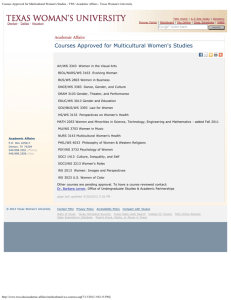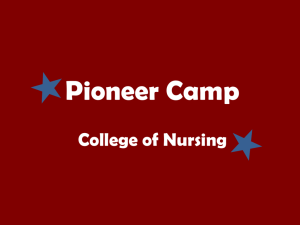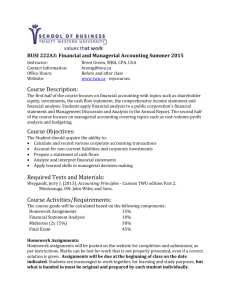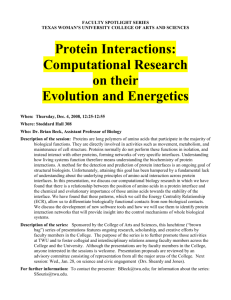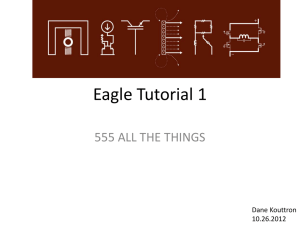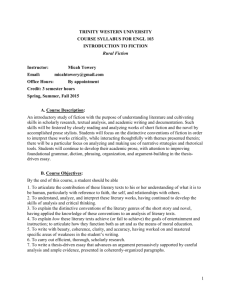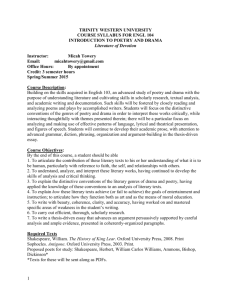Research Strategies (abridged) - 1 PDF of this Page CONTENTS:
advertisement
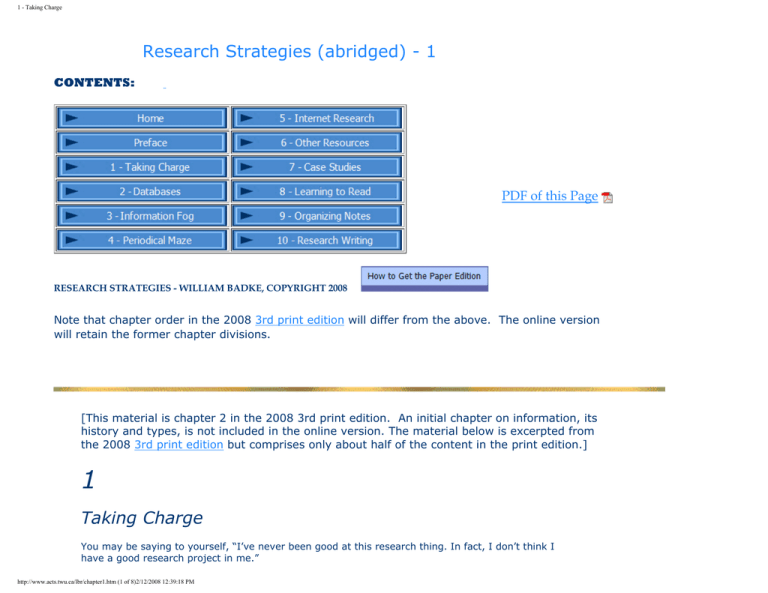
1 - Taking Charge Research Strategies (abridged) - 1 CONTENTS: PDF of this Page RESEARCH STRATEGIES - WILLIAM BADKE, COPYRIGHT 2008 Note that chapter order in the 2008 3rd print edition will differ from the above. The online version will retain the former chapter divisions. [This material is chapter 2 in the 2008 3rd print edition. An initial chapter on information, its history and types, is not included in the online version. The material below is excerpted from the 2008 3rd print edition but comprises only about half of the content in the print edition.] 1 Taking Charge You may be saying to yourself, “I’ve never been good at this research thing. In fact, I don’t think I have a good research project in me.” http://www.acts.twu.ca/lbr/chapter1.htm (1 of 8)2/12/2008 12:39:18 PM 1 - Taking Charge My response is, “Of course you don’t. A good research project is out there, not inside you. What you have to do is get out there, find the data, work with it,and use it to make a difference.” At this point, be aware that we are talking about a certain kind of research here, not the social scientific or scientific research that involves experiments, but informational research such as you will find in the humanities or in literature reviews in the social sciences and sciences. This kind of research is all about data and information, its discovery and use. Now, before you run off to a dark alley frequented by black market sellers of data, let me offer you a safer alternative. What follows is a list of basic things that you need to have working for you in order to turn your anxiety into a brilliant project, leading to an excellent product. ● ● ● ● You need an intense desire to do a brilliant project, not just an average one. By definition, most people can do an average project. You need to take your time and plan your research as a strategy rather than as a mad dash through libraries and databases. You need to become a friend to structure. Structure and organization, from the beginning of the process all the way to its triumphant end, is crucial, no matter how much pain it will cost you to change your ways. You need to develop lateral thinking. Lateral thinking is akin to what happens in a football game: The quarterback has no openings at all. If he runs with the ball, he’ll be flattened. So, instead of moving forward, he throws the ball sideways to another player who can move it forward. These are the steps: • Recognize that your advance along one line is blocked. • Abandon your approach and look for another that is completely different. • Run with your new approach and make it work (or try yet another). It’s like the old story of the truck that got stuck in a highway underpass. No towing vehicle of any kind could get it out, and so the workers were left with the option of dismantling an expensive truck or tearing down an even more expensive underpass until… … until the light bulb went on and some bright lateral thinker suggested letting the air out of the truck’s tires to lower it. Lateral thinking works beyond the obvious, in the realm of the creative. Nurture this lateral thinking gift within you. It will help greatly in that moment when all your cherished strategies have failed you and you still don’t have the information you need. [Example added here in 2008 3rd print edition] http://www.acts.twu.ca/lbr/chapter1.htm (2 of 8)2/12/2008 12:39:18 PM 1 - Taking Charge Wrestling with a Topic [See 2008 3rd print edition] Elements of False Research ● ● ● ● False research assumes that the task is merely to gather data and synthesize it. Thus the typical student “research” project involves amassing data, reading and absorbing it, then regurgitating it back onto a fresh piece of paper (sorry for the disgusting image). False research deals in generalities and surveys. It loves a superficial look at a big topic, and it abhors depth and analysis. False research asks no analytical questions and makes no pretense of advancing knowledge. It’s happy just to report on what has already been done, to summarize the past. False research is so boring that you should be surprised it ever gets completed, let alone foisted on your longsuffering professor. The Key to Genuine Research [See 2088 3rd print edition] A Model for Research What, then, is research all about? Here’s a model: http://www.acts.twu.ca/lbr/chapter1.htm (3 of 8)2/12/2008 12:39:18 PM 1 - Taking Charge Explanation? ● You begin with a question. ● You collect data. ● You synthesize it (put it together in some coherent form). ● ● ● You analyze it in light of the question (figuring out how each piece of data could be used to answer the question). The analysis turns data into to information (processed data that is ready to be used to answer the question). You come up with conclusions and recommendations. The key to the whole thing is that you need to move beyond merely gathering data, reorganizing it (data synthesis) and reporting on what you read. When a question is injected into the mix, the data becomes more than an end in itself and turns into the raw material needed to answer the question. The result is analysis that turns data into information that can then be used to reach an answer. Looks easy, doesn’t it? Maybe it doesn’t yet, but we are about to embark on a journey that will make things much clearer. For a tutorial on the research process, go to: http://www.acts.twu.ca/lbr/chapter1.htm (4 of 8)2/12/2008 12:39:18 PM 1 - Taking Charge http://www.acts.twu.ca/LBR/ResearchModel/ResearchModel.swf Getting Started in Research Getting a Working Knowledge through Reference Sources Before you go off in all directions at once (like a draw-and-quarter competition at the local jousting match), get a grip on yourself. As I librarian, I see the same painful experience repeated day after day —students walking fearfully into our book stacks area, then stopping, frozen to the ground. I know what’s buzzing through their battered minds: “I’m here, I’m actually here in the library, about to start researching my topic, and I don’t have a clue what to do. Time has stopped, and people are staring at me. Why can’t I move my limbs? Why is my head numb? Maybe I’ll die here, rooted to the floor, and they’ll bronze me as a monument to the unknown student.” Take heart—it doesn’t have to be like this. Let me give you the first step you need to take in any research project, so that you break free from bondage. It’s simple. Get a working knowledge of your topic. Right, so what’s a working knowledge? Here’s a basic definition: You have a working knowledge of a topic when you can talk about it for one minute without repeating yourself. It isn’t complete knowledge, but it’s enough to tell you what the topic entails, what its boundaries are, even what some of its controversies, mysteries and dangers might be. So where do you get a working knowledge? You could simply go on the Internet, where virtually anything is explained by some site or other. But, if you don’t know much about the topic to begin with, the Net may be a dubious source. How will you be able to tell that the information is reliable? You would do better to investigate authoritative reference sources first. All academic libraries have recognized reference tools that provide concise and authoritative information on virtually any topic you might think of. Reference books will generally appear in the form of dictionaries or encyclopedias on general or specific topics. As well, handbooks, atlases—in fact, any tool that involves looking up brief information—may be found in a reference collection. [Further content and examples provided in the 2008 3rd print edition] Excursus:Wikipedia, the Professor’s Dilemma [See 2088 3rd print edition] [For a more in-depth discussion of Wikipedia, see my InfoLitLand column in the March/April 2008 issue of Online Magazine]. http://www.acts.twu.ca/lbr/chapter1.htm (5 of 8)2/12/2008 12:39:18 PM 1 - Taking Charge Finding a Good Question Research is not research until you have focused it around a solid research question that addresses a problem or issue. But how do you come up with a question that is going to work? Narrow your Topic to one aspect. A big reason why research can fail is that the researcher is trying to conquer the world with one project. You simply cannot cover everything about the topic of teen suicide or abortion or the causes of World War One or why the moon isn’t made of green cheese. You have to choose an aspect that is distinct enough that you can really work with it. Identify Controversies or Questions related to your narrowed approach. Thesis Statements Research questions and thesis statements are actually two sides of the same coin. A research question addresses a problem to be solved. A thesis statement is a tentative answer to a research question. It is tentative in that your written research project is going to have to test your thesis and hopefully show it to be correct. The thesis statement route does have a tendency to create a bias, so that it’s tempting to overlook or minimize evidence that does not support your case. Research Questions—the Bad and the Ugly Some research questions simply won’t work. They are doomed to failure and will produce research projects that are walking disasters, if they can walk at all. [The 2008 3rd print edition, at this point, and in APPENDIX One; this material is not included in the online version] 1. The Question that Isn’t There. Imagine the horror of someone reading your “research” paper and looking desperately but in vain for a question, only to discover that there is none or the question you do have only asks you to compile existing data. 2. The Fuzzy Question. Sure, there’s a question, but it isn’t defined or focused enough to make it possible to answer. 3. The Multi-part Question. You must never let more than one research question intrude into a research project. 4. The open-ended question. This is often expressed as, What are the implications of … or What were the results of … followed by an expected list of possible outcomes. Open-ended questions tend to be troublesome simply because they fragment your conclusion into many conclusions and http://www.acts.twu.ca/lbr/chapter1.htm (6 of 8)2/12/2008 12:39:18 PM 1 - Taking Charge thus destroy the single focus you needed to seize upon. 5. The Question that Will Not Fly. Some questions are amazingly inventive,but try to answer questions thatthe data simply will not answer. In my experience, the best research questions are simple ones that require a good deal of analysis to answer. The Preliminary Outline Chances are, if you’re like most people, that you’re not in any mood at this point to start thinking about an outline for your project. People who start working on their outline before they’ve done their first catalog search are either sick or lost souls, because any sensible person knows that you compose your outline AFTER you write your paper. Wrong. If you want to spare yourself a ton of grief, start on an outline now. How do you develop a preliminary outline? Begin with your research question and root your outline in its terminology. Your preliminary outline is just that—preliminary. You can change it and develop it at will, or even scrap it and create a new one. But you need to start on your outline as soon as you have a research question, because the outline tells you what you need to cover in order to write the paper that answers your research question. How About a Few Good Examples? [Examples in 2008 3rd print edition only] One final note of caution: Always clear your narrowed-down topic and brilliant research question with your professor or supervisor. Disaster could be awaiting you if you don’t. Of course, some of us like to flirt with disaster. Do you feel lucky? For Further Study Study Guide [See 2008 3rd print ed.] Practice with Research Questions [See 2008 3rd print ed.] Assignment for a Research Project of Your Own [See 2008 3rd print ed.] http://www.acts.twu.ca/lbr/chapter1.htm (7 of 8)2/12/2008 12:39:18 PM 1 - Taking Charge TOP OF PAGE ON TO CHAPTER TWO Last revised: February 4, 2008 http://www.acts.twu.ca/lbr/chapter1.htm (8 of 8)2/12/2008 12:39:18 PM
